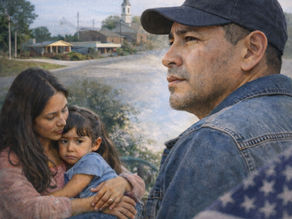Joaquín Alfredo-Angel Rubalcaba

Explore the Research
Discover the latest insights and research findings
Joaquín Alfredo-Angel Rubalcaba, Ph.D.

About Me
I am an Associate Professor in the Department of Public Policy at UNC Chapel Hill. I earned my Ph.D. in Economics from the University of New Mexico and am an alumnus of the RWJF doctoral fellows program. Additionally, I am a faculty fellow at the Carolina Population Center at UNC-Chapel Hill, a faculty affiliate at the Samuel DuBois Cook Center for Social Equity at Duke University, and an affiliate of the Native American Budget and Policy Institute.
As an applied microeconomist and public policy scholar, my research centers on the urgent need for comprehensive U.S. immigration reform and the consequences of this outdated arrangement, specifically as a barrier to upward mobility for vulnerable families. My work also delves into the evolution of the criminal legal system as a mechanism of immigration enforcement, mainly how immigration enforcement practices contribute to disparities in contact with the criminal legal system. Empirical evidence from this work documents the impacts of these interactions on individuals, families, and communities, focusing on how enforcement practices, such as police stops and ICE arrests, shape social and economic outcomes.
In my research, I take an interdisciplinary approach to addressing the barriers to upward mobility for vulnerable families in the U.S., exploring how challenges in labor markets, healthcare access, educational opportunities, criminal justice, and immigration policies collectively perpetuate inequities. By analyzing these compounded effects, I aim to identify comprehensive policy solutions that address the root causes of socioeconomic disparities.
Courses
PLCY310:
Microeconomics Foundations for Public Policy
This course is designed to strengthen your understanding of microeconomic theory as applied to public policy and analysis. The methods used to answer many public policy questions are firmly rooted in the theoretical and empirical frameworks developed within microeconomics, which are based on a paradigm of rationality, maximization, and perfect information. These fundamental elements have largely been used as the framework to investigate the impacts of public policies on social welfare.
PLCY349:
Immigration Policy in the 21st Century
This course examines 21st-century U.S. immigration through multiple disciplinary lenses. We explore the evolution of immigration policies, their historical context, and their current place in political discourse. The curriculum covers migration theories, acculturation, and assimilation, analyzing their impact on immigrant well-being and social welfare in the U.S.
PLCY749:
Migration & Health
This course examines the intersection of U.S. immigration policies and healthcare systems, focusing on their combined impact on immigrant health and wellbeing. Students will explore migration theories, public health concepts, and emerging paradigms in migration health. While acknowledging the global significance of migrant health, the course emphasizes Latino experiences in the U.S., analyzing how issues of deservingness and access shape health outcomes for immigrant populations.
PLCY54:
US Immigration
U.S. immigration policies, which create the socioeconomic and political environment for immigrants living in the U.S., have been a topic of contentious and, oftentimes, vulgar debates throughout history. Currently, the immigration debate is at the forefront of the U.S. political discourse, placing immigrants and their families at the center of an ideologically divided country. This seminar will explore U.S. immigration and its evolution from several disciplinary perspectives. Specifically, we will rely heavily on readings and discussions to build a fundamental understanding of U.S. immigration across historical, political, sociological, and economic contexts.





